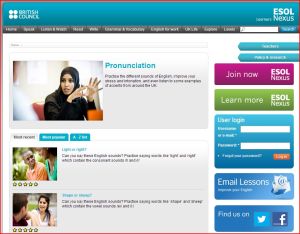It can be hard to know what to focus on when it comes to pronunciation, especially if you have a group for a short time or there’s a wide range of needs. This is the first in a series of posts which aims to help.
One of the great things about adopting an ELF approach is that a clear set of priorities has already been identified, based on research about what’s most likely to cause communication breakdown. This research was used by Jennifer Jenkins to draw up the Lingua Franca Core (LFC), which you can learn more about here. Obviously the key features she identifies might not be problematic for all learners, and the only way to know what will benefit your students is to do a needs analysis. That said, there are three main areas which we’ve found ourselves coming back to again and again in our classrooms:
1) Minimal pairs (e.g. pin / bin, or ship / sheep. Obviously the specific minimal pair depends on the students’ needs.)
2) Nuclear stress (e.g. “Shall we go CYcling at the weekend?” as opposed to, say, going shopping)
3) Communication strategies (e.g. trying to explain what you mean in another way, bypassing problematic vocabulary, or asking your interlocutor to explain what something means). This is relevant to pronunciation in the sense that if learners are aware that it is their pronunciation of a particular word (or their interlocutor’s pronunciation) that is causing communication breakdown, then they need strategies to move the conversation forward.
As part of a workshop on ELF pronunciation, I asked the lovely teachers on Bell’s Delta course to brainstorm classroom activities for these three areas. We’ve typed up their ideas and added a few suggestions of our own, starting with…
Minimal pairs
- Sound posters to collect words with the same sounds
- Tongue twisters (check out the British Council’s Learn English Kids site for inspiration)
- Drilling
- Snap
- Board slap with fly swatters (here is an explanation of how to do a board slap for vocabulary – the same ideas apply for sounds)
- Battleships (click here to download our free template for this game)
- Jump forwards / backwards when you hear a particular sound
- Run to a poster showing a phoneme when you hear that particular sound
- “Pronunciation Journey” – an activity from Mark Hancock’s fabulous Pronunciation Games book. You can download instructions for free via his website where there are also other free materials for minimal pairs.
- Dominoes with matching sounds
- ‘Silent’ dictation to encourage learners to focus on articulation, by only allowing them to mouth or whisper the words.
- Bingo (see an example of a pronunciation bingo here, as well as some useful tips on how not to teach minimal pairs!)
- Clap if you hear a particular sound
- Telephone number dictations
- Dictation which includes lots of minimal pairs (dictation from teacher to student, or student to teacher, or student to student)
- The pronunciation page of the British Council’s ESOL Nexus website
Many thanks to Amra, Chris, Natalia, Mark, Adriana, Lara, Alex, Marie-Anne, and Sam, for sharing these ideas.


Pingback: Minimal pairs - 'ELF priorities' | TELT | Scoo...
Pingback: Minimal pairs - 'ELF priorities' | Ressources p...
Pingback: Minimal pairs | Pearltrees
Pingback: Minimal pairs | Pearltrees
Pingback: Minimal pairs | Pearltrees